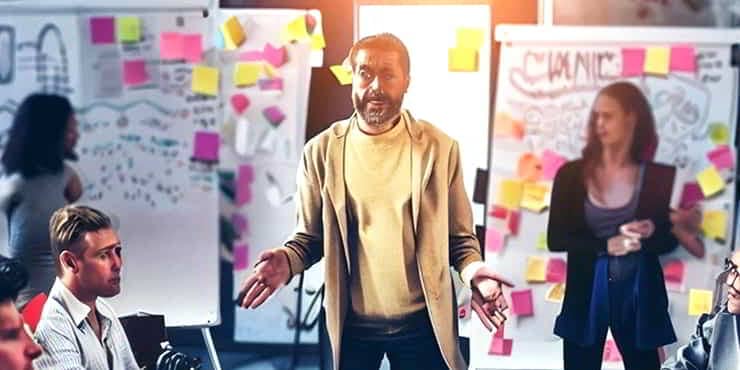Develop Outstanding Facilitation Skills For Running Workshops

Estimated reading time: 20 Min
Discover insights into mastering workshop facilitation skills. Introducing a facilitator’s skills, techniques, and strategies needed to run great workshops.
The article aims to equip budding facilitators with practical knowledge and actionable tips to enhance their facilitation abilities, enabling them to run exceptional workshops that generate valuable outcomes and leave a lasting impact on participants.
It’s important, though, to realise that learning the skills will only develop through practice.
Working as a coach and facilitator since 1980, facilitating workshops has been my most challenging, exhausting, yet most satisfying role of my life so far.
What exactly is a workshop?
For those who don’t know, a workshop is a structured and interactive session that brings together a group of individuals with a common goal or interest.
Unlike lectures or presentations, workshops actively engage participants through hands-on activities, discussions, and practical exercises.
They can cover a wide range of topics and, most often, in my experience, are used for planning for organisational change or addressing challenges or problems.
Workshops are often designed to stimulate learning, collaboration, and skill development as well.
The Importance of Workshop Facilitation Skills
Facilitation refers to the process of guiding and enabling a group of individuals to work together effectively towards achieving the workshop’s objectives.
A skilled facilitator acts as a neutral guide, creating a supportive environment that encourages participation, fosters collaboration, and maximises learning outcomes.
The facilitator’s role is pivotal in structuring and managing group dynamics, maintaining focus and engagement, and ensuring that all participants have an equal opportunity to contribute and learn.
Understanding the Role and Responsibilities of a Facilitator

So, a facilitator is an individual who guides and manages the workshop process to ensure its smooth and productive execution.
They are responsible for creating a supportive and inclusive environment where participants feel comfortable expressing their ideas, engaging in discussions, and collaborating with one another.
The facilitator acts as a neutral party.
The workshop is not about them!
The facilitator’s responsibilities include:
- Setting the stage
First, the facilitator ensures that all the necessary equipment is available in the workshop environment. This includes flip charts and stands with indelible pens, or nowadays, a surface for projection of a digital workspace such as Miro, plus notepaper and writing implements for participants to use.
In addition, decide if tables are needed.
Tables often simply act as a barrier between participants and are best moved to the edges of rooms. Also, it may be useful to have access to a number of rooms for breakout sessions during a workshop. - Clarify workshop outcomes
The facilitator establishes clear goals, objectives, and expectations for the workshop, ensuring that participants understand the purpose and desired outcomes. - Designing the workshop
The facilitator plans and structures the workshop agenda, selecting appropriate activities, exercises, and methodologies to achieve the objectives. - Guiding discussions
The facilitator encourages meaningful discussions, asks thought-provoking questions, and ensures that all participants have the opportunity to contribute their perspectives. - Managing group dynamics
The facilitator monitors and addresses any conflicts, power imbalances, or disruptive behaviours that may arise within the group, fostering a respectful and inclusive environment. - Time management
The facilitator keeps the workshop on track, manages time effectively, and ensures that all agenda items are covered within the allocated timeframe. - Summarising and synthesising
The facilitator summarises key points, synthesises discussions, and helps the group identify common themes or conclusions. - Providing closure
The facilitator concludes the workshop, summarises the key takeaways, and helps participants reflect on their learnings and, most importantly, their next steps.
Key qualities and skills of an effective facilitator
By understanding the facilitator’s role and recognising the key qualities and skills that make a facilitator effective, you will gain a deeper understanding of the facilitation process and the attributes they can cultivate to become proficient workshop facilitators.
Essential qualities and skills that contribute to effective facilitation include:
- Active listening
A skilled facilitator listens attentively to participants, demonstrates empathy, and shows genuine interest in their perspectives. This fosters trust and encourages open communication. - Communication skills
Effective facilitators possess strong verbal and non-verbal communication skills. They can articulate ideas clearly, ask insightful questions, and adapt their communication style to suit different participants. - Flexibility and adaptability
Facilitators should be flexible and able to adapt to unexpected changes or challenges during the workshop. They can adjust the agenda or activities as needed to ensure the workshop’s success. - Emotional intelligence
Facilitators with high emotional intelligence can read and understand the emotions of participants, manage their own emotions, and create a safe and supportive environment. - Problem-solving skills
Facilitators are adept at identifying and addressing challenges that arise within the workshop. They can think critically, propose solutions, and guide participants towards resolution. - Cultural sensitivity
A skilled facilitator demonstrates cultural sensitivity and inclusivity, recognising and valuing diverse perspectives, experiences, and backgrounds. - Facilitation techniques
Effective facilitators employ a variety of techniques, such as brainstorming, consensus-building, decision-making, and conflict resolution, to guide the group towards productive outcomes.
Preparing to run a workshop
By emphasising the importance of thorough research and needs assessment, setting clear objectives, and designing an engaging workshop agenda, facilitators can ensure that their workshops are well-prepared, relevant, and impactful.
These preparatory steps often require some negotiation with whoever is the natural leader (in the work environment, that’s often a manager) of the group.
This may include negotiations for the purpose, content, and agenda of the workshop and the natural leader’s role within it.
If the nominal leader of a group is attending, it’s important for them to accept that, in the context of the workshop, they are a contributing member of the team.
The facilitator is in control of the workshop.
It’s important to lay a strong foundation for a successful facilitation process and create a positive learning environment for all participants.
Conducting thorough research and needs assessment
Before diving into the facilitation process, facilitators need to have gathered relevant information and understand the specific needs and expectations of the participants and stakeholders.
The natural leader (as introduced in the previous section) is likely to be the main source of such relevant information.
However, one of the early steps in the facilitated process should involve getting confirmation from the group of participants that they all understand and support the purpose of the workshop, and agree that they are there to participate actively.
The facilitator should:
- Identify the target audience
With the help of the natural leader, a facilitator should determine the characteristics of the intended participants, such as their background, knowledge level, and roles. This helps in tailoring the workshop content and activities to suit their specific requirements. - Understand the objectives
A facilitator must thoroughly comprehend the purpose and goals of the workshop. This includes any problems to be addressed, the outcomes to be achieved, and the desired impact on the participants or the organisation. This includes an appreciation of the subject matter to be discussed, but the facilitator is not expected to be an expert; expertise comes entirely from the participants. - Conduct a needs assessment
This involves gathering information, if necessary through surveys, interviews, or focus groups to understand the participants’ current knowledge, skills, and challenges related to the workshop topic. This assessment helps in customising the content and designing targeted learning experiences. - Researching the subject matter
Facilitators need to have a reasonable understanding of the workshop topic. They should research relevant theories, best practices, and perhaps case studies to ensure they are well-prepared to guide meaningful discussions and provide valuable insights.
Setting clear objectives and defining desired outcomes
Here, I highlight the significance of setting clear and measurable objectives for the workshop.
Clear objectives serve as a roadmap for the facilitator and participants, ensuring that everyone is aligned on what they aim to achieve.
The workshop’s objectives should be clarified and agreed upon at the start of the workshop.
Specificity and clarity
Objectives should be precise, clearly defining what participants will learn, accomplish, or gain from the workshop.
Ambiguity should be avoided to maintain focus and guide the facilitation process effectively.
Measurability
Objectives should be formulated in a way that allows for measurable outcomes.
This enables facilitators to evaluate the success of the workshop and provides participants with tangible indicators of their progress.
Participant-centric approach
Objectives should consider the needs and expectations of the participants.
By aligning the objectives with participants’ desired outcomes, facilitators can increase engagement and relevance, fostering a more impactful workshop experience.
Design an engaging workshop agenda and activities
In order to design an engaging and well-structured workshop agenda and activities that align with the objectives, the facilitator needs to understand and cater to the participants’ needs.
Sequential flow
The workshop agenda should have a logical sequence that guides participants through various stages or steps, ensuring a smooth transition from one activity to another.
This helps in building momentum and maintaining participants’ interest.
Variety of activities
Incorporating a mix of activities such as presentations, discussions, group work, case studies, and hands-on exercises promotes active engagement and caters to different learning styles.
Variety also helps in sustaining participants’ attention and enhancing the overall workshop experience.
Time allocation
Each activity should be allocated an appropriate amount of time, considering its importance and complexity.
Facilitators should ensure that they have enough time for in-depth discussions, reflection, and achieving the desired outcomes.
Interactive and participatory approach
The workshop design should encourage active participation and interaction among participants.
This can be achieved through ice-breakers, group exercises, role plays, and other interactive techniques that foster collaboration, knowledge sharing, and skill development.
Create a Supportive Workshop Environment

By focusing on establishing a positive and inclusive atmosphere, cultivating trust and rapport among participants, and effectively managing group dynamics, facilitators create a supportive workshop environment that encourages active engagement, collaboration, and a sense of belonging.
This environment enhances the overall workshop experience, leading to increased learning outcomes and participant satisfaction.
How to establish a positive and inclusive atmosphere
It is most important from the outset to create a positive and inclusive atmosphere within the workshop setting.
A supportive environment promotes active participation, open communication, and a sense of psychological safety among participants. Introductions to a workshop should include the following:
Welcoming introductions
Facilitators can begin by conducting ice-breaking activities that encourage participants to introduce themselves, share their expectations, and build initial connections.
This helps in creating a friendly and inclusive atmosphere from the start.
Setting ground rules
Establishing clear ground rules or guidelines for respectful communication and behaviour helps create a safe space for participants.
Ground rules should encourage active listening, empathy, and open-mindedness while discouraging disruptive or disrespectful behaviour.
Encouraging diverse perspectives
Facilitators should explicitly promote the value of diverse perspectives and create opportunities for participants to share their unique insights and experiences.
This fosters an inclusive environment where participants feel respected and empowered to contribute.
The Fridge!
In a dynamic workshop, staying focused on a current activity is important for productivity.
Potentially useful ideas are often expressed at a time when they aren’t directly useful to a current subject.
Such ideas can be disruptive if discussed at the wrong time, or forgotten if simply ignored.
So, with the group’s permission, such ideas can be quickly stored in a “fridge” (flipchart or digital page), that’s ideally visible to all and kept “fresh” there for later consideration.
By installing the “fridge,” participants know that everything they say can be captured, even if not acted on right away.
At the end of the workshop, it’s useful to allow a little time for the content of the “fridge” to be examined, and the person who raised the idea should be given the opportunity to develop it further.
In my experience, most items held in the fridge are covered naturally at some point.
Anything outstanding that can’t be handled right away may need to be added to a future plan.
Cultivating trust and rapport among participants
In addition to a positive and inclusive atmosphere, cultivating trust and rapport among participants positively impacts collaboration, engagement, ideation, and earning outcomes.
Building relationships
Facilitators can facilitate activities that encourage participants to interact and collaborate with one another.
Group exercises, pair-sharing, or small group discussions allow participants to get to know each other, build connections, and establish a foundation of trust.
Active facilitator presence
Facilitators should actively engage with participants, listen attentively, and demonstrate genuine interest in their contributions.
This active presence helps in building rapport and trust among participants, as they feel supported and acknowledged.
Encouraging dialogue
Facilitators can create a safe space for open dialogue by actively encouraging questions, comments, and discussions.
By validating participants’ input and ensuring that diverse opinions are respected, facilitators foster an environment where everyone feels comfortable expressing their thoughts.
Managing group dynamics and encouraging collaboration
A key role of the facilitator is to remain aware of the atmosphere within the group, actively manage group dynamics, and foster collaboration among participants.
- Facilitating active participation
Facilitators should create opportunities for equal participation, among all participants. Use techniques like round-robin sharing, think-pair-share, or small group discussions, ensuring that everyone’s voice is heard and valued. - Mediating conflicts
In the event of conflicts or disagreements, facilitators should employ conflict resolution techniques, such as active listening, empathy, and impartial mediation. By addressing conflicts constructively and encouraging respectful dialogue, facilitators help maintain a positive and collaborative atmosphere. - Promoting collaboration
Facilitators can design activities that promote teamwork and collaboration, such as group problem-solving exercises or group projects. Encouraging participants to work together fosters collective learning, synergy, and the exchange of ideas.
Facilitation Techniques and Strategies
By employing active listening and effective communication techniques, asking powerful questions, managing time effectively, using role-play techniques and exercises, and encouraging participation while managing different personalities, facilitators create an engaging and inclusive workshop environment.
These techniques and strategies enhance collaboration, foster meaningful discussions, and maximise the learning potential for all participants.
Active listening and effective communication
- Active listening
Active listening involves focusing on the speaker, understanding their perspective, and providing verbal and non-verbal cues to show your engagement and comprehension.. Facilitators should give their full attention and demonstrate genuine interest. - Reflective responses
Facilitators can use reflective responses, such as paraphrasing or summarising participants’ ideas, to ensure accurate understanding and validate their contributions. Reflective responses also encourage further clarification, leading to deeper discussions. - Non-verbal communication
Facilitators should pay attention to their non-verbal cues, such as maintaining eye contact, nodding to show understanding, and using appropriate facial expressions. These non-verbal signals help establish rapport, trust, and a sense of connection with participants.
Ask powerful questions to stimulate discussion and reflection
- Open-ended questions
Facilitators should use open-ended questions that cannot be answered with a simple “yes” or “no.” Open-ended questions encourage participants to provide more in-depth responses, share their insights, and explore multiple perspectives. - Probing questions
Probing questions help to delve deeper into a topic, uncover assumptions, or encourage participants to think critically. Probing questions challenge participants’ thinking and stimulate robust discussions. A word of warning: be gentle if you ask “why?”. Sometimes asking why invokes a reaction from the listener that leads to them trying to justify a previous statement in an emotive way. - Thought-provoking questions
Facilitators should pose thought-provoking questions that spark curiosity, encourage reflection, and inspire creative thinking. These questions prompt participants to consider different angles and explore alternative solutions.
Managing time and maintaining a productive pace
This is less about time management than about having clear priorities and actively managing energy levels throughout a workshop.
Time allocation
I recommend learning about the Nominal Group Technique (NGT) for brainstorming (see Brainstorming techniques below).
Facilitators should allocate time for each agenda item or activity based on its relative priority and complexity.
They should also consider participants’ engagement levels and adjust the pace accordingly.
Timekeeping
Facilitators should monitor the time consistently to ensure that the workshop stays on track.
They can use visual cues, such as timers or clocks, to keep participants informed about the remaining time for activities.
Flexibility in time management
While adhering to the schedule, facilitators should also be flexible and adapt to the needs of the participants.
This includes allowing additional time for fruitful discussions or adjusting the agenda if unexpected insights or challenges arise.
Encourage participation and manage different personalities
In every group of humans, there’ll be a mix of introverts and extroverts.
Some participants may well need to be actively encouraged to get involved.
Inclusive participation
Facilitators should create a supportive environment that encourages all participants to contribute.
They can use techniques like round-robin sharing, breakout groups, or paired discussions to ensure that everyone has an opportunity to participate.
Managing introverted and extroverted participants
Facilitators should be mindful of different personality traits and create opportunities for both introverted and extroverted participants to engage.
This can include providing thinking time before discussions or using structured activities that balance individual and group participation so that less expressive personalities have opportunities to contribute.
Addressing challenging dynamics
Facilitators should be prepared to manage challenging dynamics that may arise during the workshop.
This can involve addressing dominant personalities, mediating conflicts, and ensuring that all participants’ voices are heard and respected.
Brainstorming techniques
The nature of most creative workshops includes various brainstorming and decision making sessions sessions.
The “facilitator’s toolkit” should include a variety of brainstorming techniques.
Personally I found all of the brainstorming techniques outlined in the post “Unleash Your Creativity: 10 Brainstorming Techniques” to be useful and always included “Technique 10: Nominal Group Technique (NGT).”
A facilitator’s toolkit should also contain a range of strategies that support both the facilitator’s function and the workshop participants’ interests.
Handling Challenges and Difficult Situations
By addressing conflicts and disagreements, effectively handling resistance, and adapting to unexpected situations and disruptions, facilitators ensure the smooth flow of the workshop and maintain a productive and engaging learning environment for all participants.
These skills help facilitators navigate challenging situations with confidence, creating opportunities for growth, collaboration, and positive outcomes.
Dealing with conflicts and disagreements
Active listening and empathy
This is where active listening skills are especially advantageous.
Facilitators should listen attentively to the concerns and perspectives of conflicting parties and demonstrate empathy.
By showing understanding and acknowledging emotions, facilitators create a safe space for participants to express themselves and work towards resolution.
Neutral facilitation
Facilitators should remain neutral and impartial when mediating conflicts.
They can establish ground rules for respectful communication, encourage active listening, and facilitate constructive dialogue that focuses on understanding different viewpoints and finding common ground.
Problem-solving techniques
Facilitators can employ problem-solving techniques such as brainstorming, consensus-building, or identifying shared goals to help participants collaboratively resolve conflicts.
By guiding the group towards solutions rather than imposing their own opinions, facilitators empower participants to take ownership of the resolution process.
Addressing resistance and maintaining engagement
Understanding resistance
Facilitators should recognise that resistance can stem from various factors, such as fear of change, lack of interest, or differing perspectives.
By understanding the root causes of resistance, facilitators can tailor their approach to address specific concerns.
Creating relevance
Facilitators should emphasise the relevance and benefits of the workshop content to address participant resistance.
By highlighting how the workshop aligns with participants’ goals, challenges, or professional growth, facilitators can motivate and engage participants.
Encouraging active participation
Facilitators should use interactive techniques and activities to keep participants engaged.
This can include group discussions, hands-on exercises, or multimedia presentations that stimulate interest and active involvement.
Personalising learning experiences
Facilitators can offer opportunities for participants to contribute their experiences, examples, or case studies related to the workshop topic.
By incorporating their input, facilitators foster a sense of ownership and increase participant engagement.
Adapt to unexpected situations and manage disruptions
Remaining calm and composed
Facilitators should maintain a calm and composed demeanour in the face of unexpected situations or disruptions.
This helps to reassure participants and maintain the overall workshop atmosphere.
Flexibility in the agenda
Always remember that the primary role of the facilitator is to help participants achieve something that they want in a workshop environment.
It is the participants workshop!
Facilitators should be prepared to adapt the workshop agenda and activities if unexpected situations arise.
This may involve rescheduling or modifying activities to accommodate unforeseen circumstances.
Redirecting focus
In the event of disruptions or tangential discussions, facilitators should tactfully redirect the focus back to the workshop objectives.
This can be done by summarising key points, refocusing the discussion, or gently intervening to steer the conversation towards the intended direction.
Engaging participant support
Facilitators can enlist the support of participants in managing disruptions by seeking their assistance in maintaining the workshop’s flow and atmosphere.
This encourages a sense of shared responsibility and collaboration among participants.
Enhancing Facilitation Skills Through Continuous Improvement
By actively seeking feedback, engaging in self-reflection, pursuing continuous learning and professional development opportunities, and incorporating feedback into the workshops they lead, facilitators embark on a journey of continuous improvement.
A commitment to growth and adaptation ensures facilitators remain adaptable, relevant, and capable of delivering increasingly effective and impactful facilitation experiences.
Through their dedication to continuous improvement, facilitators cultivate an environment of growth, transformation, and learning for both themselves and their workshop participants.
Seeking feedback and self-reflection
Feedback from participants
Facilitators should actively seek feedback from workshop participants to gain insights into their experiences, perceptions, and suggestions for improvement.
This feedback is best collected as the final exercise of a workshop but can be collected through post-workshop evaluations, surveys, or individual conversations.
By attentively listening to participants’ perspectives, facilitators can identify areas of strength and areas that need further development.
They can also gain a deeper understanding of participants’ needs and preferences, allowing for targeted improvements in future workshops.
Feedback from peers or colleagues
Facilitators can also seek feedback from their peers or colleagues who have experience in facilitation.
Engaging in peer-to-peer evaluations, observation sessions, or participating in communities of practice enables facilitators to exchange feedback, share best practices, and receive constructive criticism.
Learning from the experiences of fellow facilitators enriches their own practice and provides valuable insights for growth.
Self-reflection
Facilitators should regularly engage in self-reflection to assess their facilitation approach, identify strengths, and recognise areas for growth.
If the group is going through an end-of-workshop feedback exercise, it is also useful for the facilitator to go through the same exercise.
Through introspection, analysis of their facilitation performance, and contemplation of participant feedback, facilitators can gain valuable self-awareness.
Self-reflection helps identify patterns, biases, and areas that require improvement, allowing facilitators to continuously refine their skills and deepen their understanding of their own facilitation style.
Incorporating feedback into future workshops
Having taken the trouble to seek feedback, it only makes sense to use it!
Reflecting on feedback
Facilitators should carefully analyse the feedback received, identifying common themes, strengths, and areas for improvement.
By reflecting on the feedback, facilitators gain a deeper understanding of their impact on participants and the effectiveness of their facilitation techniques.
This reflection serves as a foundation for continuous improvement and guides the facilitator’s growth journey.
Iterative approach
Facilitators should adopt an iterative approach to enhance their facilitation skills.
Building on feedback and self-reflection, facilitators continuously refine their facilitation techniques and strategies.
They make deliberate adjustments, experiment with new methods, and integrate lessons learned into their facilitation practice.
This iterative process ensures ongoing growth, refinement, and adaptability in response to evolving participant needs and changing workshop contexts.
Experimenting with new approaches
Facilitators can leverage feedback as an opportunity to experiment with new facilitation techniques, activities, or methodologies in future workshops.
Incorporating suggestions and trying out innovative approaches allows facilitators to evolve their practice, expand their repertoire, and explore fresh ways to engage participants and achieve desired outcomes.
By embracing experimentation, facilitators contribute to their own professional growth and enrich the workshop experiences they offer.
Continuous learning and professional development
In addition, here are a few more opportunities for facilitators to further develop their skills:
- Read relevant literature
Facilitators should stay updated with current literature, research, and publications on facilitation. Reading books, articles, and blogs written by renowned facilitators and subject matter experts broadens their understanding and exposes them to diverse perspectives. This continual learning helps facilitators stay informed about innovative approaches and incorporate fresh ideas into their practice. - Engage in professional networks
Facilitators should actively engage in professional networks, online communities, or discussion forums to connect with other facilitators. These platforms provide opportunities for knowledge sharing, collaborative learning, and the exchange of ideas and experiences. Engaging in professional networks fosters a sense of belonging, encourages ongoing dialogue, and facilitates the discovery of new approaches and techniques. - Seek mentorship
Facilitators can benefit from seeking mentorship from experienced facilitators who can provide guidance, share their expertise, and offer personalised feedback and advice. Establishing a mentor-mentee relationship allows facilitators to receive tailored support, gain insights from someone with extensive experience, and accelerate their professional development.
Important Lessons learned from my feedback
Here are a few examples of learning points that arose from feedback from some of my workshops:
- Tailoring to participant needs
A mistake I made was not respecting that the workshop is for participants as opposed to me as their facilitator! I learned the importance of truly understanding and being flexible around participant’s needs and customising the workshop accordingly. I learned that investing enough time up front to understand participants required outcomes helped to avoid some obstructive behaviours. Facilitators can design workshops that address specific challenges and resonate with participants, leading to more impactful outcomes. - Creating a supportive environment
Fortunately, I learned, through a role-play exercise in a course, the importance of establishing a supportive and inclusive environment where participants feel safe to share their thoughts and perspectives. Facilitators should foster a positive and respectful atmosphere that encourages collaboration, open dialogue, and trust among participants. - Continuous improvement and evaluation
A lesson I was fortunate to learn early on was the value of seeking feedback from participants, reflecting on the facilitation process, and incorporating lessons learned into future workshops. I learned to ask the following 4 questions;- What worked for you?
- What didn’t work for you?
- What did you learn?
- What could have been done differently, and how?
Summary
Facilitation skills play a pivotal role in running successful workshops and creating learning experiences that have a practical and positive impact.
If you’ve read this far, you will know that mastering the art of facilitation takes dedication and practice.
By developing and using facilitation skills, you can have a profound impact on people, helping them achieve their desired outcomes and delivering constructive and memorable workshops.
So, if you find yourself needing to lead in a workshop environment, whether because you want to work in that environment or because it’s necessary in your normal day-to-day role, I hope this article has gone some way towards highlighting practical and effective methods and techniques that can make a big difference.
I encourage you to incorporate these facilitation skills into your own practice.
By doing so, you’ll experience increased participant engagement, improved collaboration, and better outcomes.
By way of final thoughts, I hope you come to experience the power and value of facilitation for yourself. It’s been the most satisfying of the many roles I’ve played.
Skilled facilitators have the ability to create meaningful learning experiences, inspire participants, and catalyse positive change.
Exceptional facilitators have an impact on individual growth, team dynamics, and organisational development, in addition to getting things done!
So, if you’re in a position where you want to have a positive impact on creativity, getting organised, and getting things done, I encourage you to apply the techniques and strategies outlined here.
By developing excellent facilitation skills, you can have a profound impact on individuals, groups, and organisations.
I also encourage you to delve a little more into “Nominal Group Technique” (NBT) for ideas on brainstorming and the “G.R.O.W.T.H. Process,” which has become a habitual process for me whenever I want to help someone else or get something done for myself.
The process personifies a mindset of continuous improvement.
I enjoyed writing this article, and I hope you’ve enjoyed reading it.
I’d love to know what you think. What worked? What didn’t? What did you learn? What could I have done differently?
I look forward to any feedback in the comments or via the contact form.
🙂
Richard






